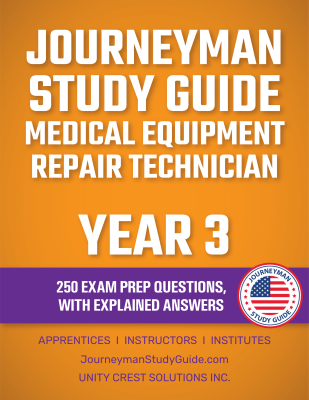Questions, Answers, & Explanations
Get clear explanations behind every answer, perfect for deeper learning and more thorough exam preparation.
Site Updates in Progress: Things might look different as we work on enhancing your experience.
What is a Medical Equipment Repair Technician?
Medical Equipment Repair Technicians, also known as Biomedical Equipment Technicians (BMETs), are skilled professionals who inspect, maintain, and repair medical devices used in hospitals, clinics, and laboratories. Their work ensures that life-saving equipment functions properly, keeping healthcare facilities running efficiently.
Key Responsibilities
Skills and Traits for Success
Industries Where Medical Equipment Repair Technicians Thrive
Why Choose This Career?
What to Expect on the Certification Exam
Many employers require certification for BMETs to ensure their competence in maintaining and repairing medical equipment. Certifications such as the Certified Biomedical Equipment Technician (CBET), offered by the Association for the Advancement of Medical Instrumentation (AAMI), are widely recognized in the industry.
Exam Format
Key Topics Covered
Passing Requirements
Most certification exams require a minimum score of 70% to pass. Some certifications also have practical assessments or experience requirements.
Tips for Preparing Effectively
Ready to Advance Your Career as a Medical Equipment Repair Technician? Prepare with our Q&A guides, Q/A Explanations, and Online Tests to pass your certification exam and excel in this in-demand field.
What Types of Questions Are on the Certification Exam?
The certification exam covers a broad range of topics to assess a technician’s technical knowledge, troubleshooting ability, and understanding of industry regulations.
Common Question Formats
Sample Questions
Tips for Answering Exam Questions
Morning: Preparing for the Day
Midday: Performing Maintenance and Repairs
Afternoon: Documentation and Preventative Maintenance
Ready to Become a Certified Medical Equipment Repair Technician? Start preparing today with our Q&A guides, Q/A Explanations, and Online Tests designed to help you pass your certification and excel in the industry.
Earning Potential
Salaries for medical equipment repair technicians vary based on experience, location, and specialization:
Regional Salary Differences
Career Growth Opportunities
The Benefits of Certification
Success Stories
General Wage Ranges
Wages in medical equipment repair depend on location, experience, and specialization:
Factors That Impact Wages
Several factors contribute to salary variations in the field:
Earnings by Industry
Opportunities for Wage Growth
Wages increase with additional certifications, specialization, and leadership roles:
Advance Your Career in Medical Equipment Repair! Take advantage of our Q&A guides, Q/A Explanations, and Online Tests to ensure certification success and maximize career earnings.
Why Join a Union or Connect with Employers?
Unions and reputable employers provide medical equipment repair technicians with job security, competitive wages, and career development opportunities. By joining a union or working for a recognized employer, technicians gain access to industry-standard training, benefits, and networking opportunities that can enhance their careers.
Benefits of Joining a Union
Top Unions for Medical Equipment Repair Technicians
Connecting with Employers
Many U.S. companies and healthcare organizations actively hire BMETs, offering stable employment and career advancement opportunities:
Tips for Finding Work
How to Stay Ahead in the Industry
Medical equipment repair is constantly evolving due to advances in healthcare technology and regulatory requirements. Staying informed about industry trends and certifications is key to maintaining job relevance and career growth.
Emerging Trends in Medical Equipment Repair
Best Practices for Professional Growth
Challenges and Opportunities
Challenges:
Opportunities:
Sustainability in Practice
Why Staying Ahead Matters
Technicians who stay current with emerging technologies, earn specialized certifications, and expand their skill sets will have the best job prospects in this growing field.
Stay Competitive in Medical Equipment Repair! Prepare for certification with our Q&A guides, Q/A Explanations, and Online Tests designed to help you succeed in the industry.
Get clear explanations behind every answer, perfect for deeper learning and more thorough exam preparation.
Quick and easy practice to test your knowledge anytime, anywhere—ideal for simple, on-the-go preparation.










